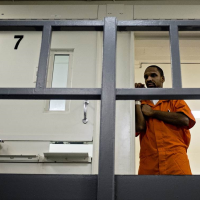Racial Disparities in Criminal Sentencing Laws Disproportionately Affect Minority Voting Rights
 (photo: J. Lawler Duggan, Washington Post/Getty Images)
(photo: J. Lawler Duggan, Washington Post/Getty Images)
By K.K. Rebecca Lai and Jasmine C. Lee, New York Times
One of every 40 American adults cannot vote in November’s election because of state laws that bar people with felony convictions from casting ballots. Experts say racial disparities in sentencing have had a disproportionate effect on the voting rights of blacks and Hispanics.
A report (pdf) by The Sentencing Project, a nonprofit organization focused on criminal justice reform, estimates that 6.1 million Americans will not be allowed to vote next month because of these laws.
State laws that bar voting vary widely. Three swing states — Florida, Iowa and Virginia — have some of the harshest laws; they impose a lifetime voting ban on felons, although their voting rights can be restored on a case-by-case basis by a governor or a court. At the other end of the spectrum, Maine and Vermont place no restrictions on people with felony convictions, allowing them to vote while incarcerated.
“The message that comes across to them is: Yes, you have all the responsibilities of a citizen now, but you’re basically still a second-class citizen because we are not permitting you to be engaged in the political process,” said Christopher Uggen, lead author of the report and a professor at the University of Minnesota.
Across the nation, 1 in 13 African-American adults cannot vote because of a felony conviction. In Florida, Kentucky, Tennessee and Virginia, more than 1 in 5 African-Americans cannot vote.
Experts cite disparities in sentencing as the underlying cause: A black person is more likely to be convicted of a felony than a white person who committed the same crime. The incarcerated population tends to include disproportionately higher numbers of low-income people and minorities.
Fourteen states automatically restore voting rights when a person who has been convicted of a felony is released.
Roger Clegg, president of the Center for Equal Opportunity, a conservative group based in Washington that opposes affirmative action, disagrees with that approach.
“If you’re not willing to follow the law,” he said, “you can’t claim the right to make the law for everyone else.”
To Learn More:
6 Million Lost Voters: State-Level Estimates of Felony Disenfranchisement, 2016 (Sentencing Project) (pdf)
Minority Youth More Likely to be Asked for ID When Voting than Whites (by Noel Brinkerhoff, AllGov)
Prison Sentences for Black Men Are 20% Longer Than Those for White Men for Same Crimes (by Noel Brinkerhoff, AllGov)
- Top Stories
- Unusual News
- Where is the Money Going?
- Controversies
- U.S. and the World
- Appointments and Resignations
- Latest News
- Trump Renames National Football League National Trump League
- Trump to Stop Deportations If…
- Trump Denounces World Series
- What If China Invaded the United States?
- Donald Trump Has a Mental Health Problem and It Has a Name






Comments